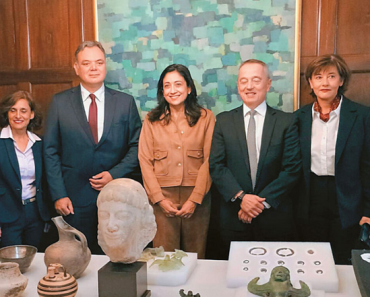
A new documentary titled The Marbles claims to settle the long-standing debate over the legal status of the Parthenon Sculptures, also known as the Elgin Marbles, stating unequivocally that these ancient sculptures were stolen from Greece.
The film, directed by David Wilkinson, demonstrates the removal of the Parthenon Sculptures from Athens while Greece was under Ottoman occupation and argues that Lord Elgin did not legally acquire them. Instead, Wilkinson describes the episode as “the greatest heist in art history.”
What does the new film say about the Parthenon sculptures?
The documentary features the opinions of notable figures, including actor Brian Cox, historian Dominic Selwood, and solicitor Mark Stephens. According to Wilkinson, Lord Elgin required substantial funds from the British government so as to pay bribes to Ottoman officials for the obtainment of the marbles, making the British state responsible for the seizure. However, questions remain as to whether Elgin had the legal right to purchase them. “Lord Elgin did sell them . . . but the question becomes, did Lord Elgin actually have the right to purchase them?” Wilkinson asked.
In opposition to this view, classical archaeologist Dr. Mario Trabucco della Torretta dismisses allegations of bribery as historically inaccurate. He pointed out that the only references to “presents” related to the removal came years after the actual removal from Athens began, questioning the notion of a “bribe now, pay later” arrangement in Constantinople at the time.
Torretta was also behind a joint letter with former UK Prime Minister Liz Truss, historian Dr. David Starkey, and Sir John Redwood, which claimed the British Museum is involved in a “covert” campaign to prevent the return of the marbles to Greece.

Did the Ottomans agree to the removal of the Parthenon Sculptures?
The central point of contention in the debate is the legitimacy of an Ottoman permission document known as a “firman,” which Elgin purportedly used to justify the removal. No original firman has been identified, only an Italian translation presumed to be of the document. Wilkinson claims it was customary for a copy to be held in Constantinople and another sent to Athens, but experts state that exhaustive searches in Ottoman archives have failed to locate it.
In 2024, Dr. Zeynep Boz, head of combating illicit trafficking for Turkey’s culture ministry, told Sky News there is no archival proof of such a firman, calling into question the document’s authenticity. The documentary also explores how other institutions have handled restitution of cultural artifacts. For instance, Glasgow’s Kelvingrove Art Gallery returned a shirt to the South Dakota Cultural Heritage Center, and Germany’s Heidelberg University as well as the Vatican, have both returned Parthenon fragments to Greece.
In contrast, the British Museum, bound by the British Museum Act 1963, cannot legally give away its treasures and maintains that discussions with Greece over a Parthenon Partnership are ongoing. The Marbles debuts in British and Irish cinemas, continuing the debate over the fate of one of the world’s most famous collections of classical art.




-370x297.jpeg)


